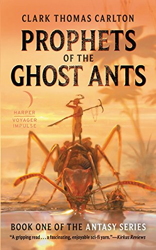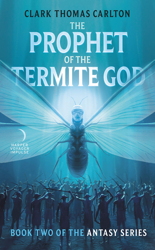
The year winds down. For me that has meant lots of medical appointments, a physical therapist kicking my ass twice a week, writing nonstop like I was Alexander Hamilton, and stealing hours and minutes from all of the above so I can still have time to spend with my wife. Stress levels have been high, but also productivity. And as others have noted, I’d rather have too much to do than too little.
Looking over his resume, I suspect the same can be said of Clark Thomas Carlton, this week’s EATING AUTHORS guest (by golly, that was a real segue this time). I invited Clark to share his most memorable meal here because he’s a novelist (check out his Antasy series, Prophets of the Ghost Ants and The Prophet of the Termite God), but he’s also a playwright (having won the Drama-Logue Critics Award for Self Help or the Tower of Psychobabble), a screen and television writer, a singer/songwriter (currently working on a pop opera about the Hanging Gardens of Babylon), and a painter.
None of which explains his current fascination with insects, but he’s on record as appreciating the use of science fantasy novels as the means of illustrating the human condition. Some folks do this going big (e.g., elephants), others take the opposite perspective. Go figure.

LMS: Welcome, Clark. What can you tell me about your most memorable meal?
CTC: Nine of the ten worst meals I have ever eaten were in Russia, and that includes the very worst and certainly the most memorable.
I was in Yeltsin’s Russia, a few years into Glasnost, and about to see Schindler’s List for the 400th time as a quality supervisor in Lucasfilm’s THX program. The first part of my stay was in Moscow at a modern hotel that had just been acquired by an American chain. The hotel’s restaurant served edible western dishes, but as someone who has worked in the industry, I know when I’m being served a boil-in-the-bag. Craving a pizza, I asked the waiter if they were any good and he assured me it was “the best in Moscow.†After serving it to me, he announced, “Your pizza by the Red Baron.â€
Near Red Square, I found a Chinese restaurant, but it was Chinese in name only. A chicken dish featured some tiny bits of meat mixed through a mass of cooked cabbage. The dish was devoid of anything like spices or even soy sauce. Some spaghetti at a so-called Italian place was topped with a couple of teaspoons of tomato puree. Parmesan cheese was not a possibility much less fresh burrata or focaccia. I loathe McDonalds, but I came to understand why there were three new ones in Moscow with very long lines because food in Russia was terrible. Under Yeltsin, Western products were flooding the country and Russians were rejecting everything made by their state industries, even their own vodka. Bananas were the latest, exotic arrival, and every trash bin in the city was piled high with their peels.
The Russian film lab, also of poor quality, was an hour outside of Moscow in a woodsy village that was a mix of industry and farming. The one and only hotel was bleak and boxy and built in the Stalin era, but it was surrounded by izbas, the little country houses made of logs bound with river mud. These were on tiny family farms with livestock, vegetable gardens and a few fruit trees. Perhaps here I might eat some genuine native dishes. The Russian food I had enjoyed in New York and San Francisco included pelmeni, the Slavic cousin of the ravioli, as well as Veal Prince Orlov, and good soups like barley mushroom and root vegetables with dill. My own dinner parties had included blinis with creme fraiche and caviar as well as that standard go-to, Chicken Kiev, which was always a crowd pleaser with its gushing puddle of chive flavored butter.
The food served in this hotel was both strange and awful and was not selected from a menu. The restaurant was a barren hall with wooden chairs, wobbly tables and grease stained table cloths. My first meal was a breakfast that I shared with my interpreter, Vasily. At some other tables, we noticed men dressed in running suits that smoked Benson and Hedges as they counted piles of pink Ukrainian money. When I asked who they were, Vasily told me they were “gangsters†and we should not make eye contact with them. “Russia is now like your Chicago in the Twenties,†he said, referring to an epidemic of gun violence.
I was served my first of a daily bowl of milky gruel, the ingredients of which I never identified. The table had two kinds of sliced gummy bread, white and brown, neither of which had flavor or a crust. Unstrained tea, swirling with leaves, was poured from a pot into glasses instead of cups. I watched as the gangsters poured Swedish vodka into their gruel, stirred it, then ate it up. “They are drinking vodka in the morning,†I whispered, but the interpreter shrugged. “We have Russian expression,†he said. “A drink in the morning and you are free all day.â€
Dinner that night was difficult. I was the only diner and arrived to find the gummy bread and a plate with a thick smear of ground mystery meat. Next to it were some hard, greenish tomatoes that were blemished and irregular, like troll noses. Beside them were some juiceless and stunted cucumbers, popping with rubbery warts. I tasted the mystery meat and found it gritty and greasy, a throwback to my high school cafeteria. I went back to my room and ate some of the Snickers bars I had been advised to bring as gifts for the Russian people.
On weekends, I was back in Moscow and my host and his lovely daughter, Nadia, were kind enough to show me Gorky Park. At that time, the park was a spectacular mess that had never seen the likes of a lawn mower. It stank from subterranean bathrooms with broken toilets that still had to be used for the usual reasons. My hosts had been informed that I wasn’t eating and tempted me into trying shashlik, the Russian version of shish kebab. They promised me it was delicious.
We picked a shashlik vendor whose grill and tables were in a circle of unkempt bushes. I offered to pay for the meal but never bothered to ask if it was lamb or beef. As we waited for our meat to cook, I saw the first of the feral dogs of Gorky Park. They weren’t a threatening pack, but were shy with sad eyes and they seemed in need of a handout. Nadia brought us paper plates of shashlik and on the side of each was a glop of sauce that stood on end that was the color of a fresh scab.
I tried to bite through the first chunk of meat and could not — it was like trying to chew through a bicycle tire. I gripped one end of the chunk with my fingernails then tugged the other with my teeth, and still it would not tear. “This shashlik is not fun,†said Nadia, a frown on her face, as she gave up. We had been served lumps of gristle that none of us could eat much less enjoy. The dogs, looking at us longingly, were waiting for just this moment. They gently took the meat from our fingers and quietly wolfed it down. As I wiped my fingers clean, I pondered that Communism had been a noble, maybe even necessary experiment in human progress, but clearly it had failed as badly as our shashlik.
A few days later, I learned what kind of meat we had eaten when I picked up the English language newspaper and read the headline: Shashlik Vendors in Gorky Park Arrested for Serving Dog Meat.

Thanks, Clark. Clearly Russia was not kind to your palate. I’m afraid to ask what that 10th worst meal might be, because is something exists more horrible than gobbets of dog gristle I don’t want to know about it.
Next Monday: Another author and another meal!

NB: links to authors and books here are included as part of an Amazon Affiliate account. If you follow any of them and ultimately make a purchase Amazon rewards me with a few pennies of every dollar.
Want to never miss an installment of EATING AUTHORS?
Click this link and sign up for a weekly email to bring you here as soon as they post.
#SFWApro
Tags: Eating Authors


